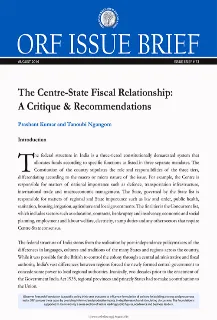The federal structure in India is a three-tiered constitutionally demarcated system that Tallocates funds according to specific functions as listed in three separate mandates. The Constitution of the country stipulates the role and responsibilities of the three tiers, differentiating according to the macro or micro nature of the issue. For example, the Centre is responsible for matters of national importance such as defence, transportation infrastructure, international trade and macroeconomic management. The State, governed by the State list is responsible for matters of regional and State importance such as law and order, public health, sanitation, housing, irrigation, agriculture and local governments. The final tier is the Concurrent list, which includes sectors such as education, contracts, bankruptcy and insolvency, economic and social planning, employment and labour welfare, electricity, stamp duties and any other sectors that require Centre-State consensus.
The federal structure of India stems from the realisation by post-independence policymakers of the differences in languages, cultures and traditions of the many States and regions across the country. While it was possible for the British to control the colony through a central administrative and fiscal authority, India’s vast differences between regions forced the newly formed central government to concede some power to local regional authorities. Ironically, two decades prior to the enactment of the Government India Act 1935, regional provinces and princely States had to make a contribution to the Union.
The Constitution of India has distinct “quasi-federal” features. Many important features of the Act were formally incorporated into the Constitution including a bias towards the Centre in administrative and judicial arrangements. This centripetal bias in fiscal policy was seen primarily in the deliberate conferment of residuary powers to the Centre. Over time, Centre-biased quasi federalism became more entrenched in the Indian system. For example, the nationalisation of major financial institutions including banking and insurance in 1969 was a sweeping change that resulted in reducing the States’ ability to deal with banks directly.
The 73rd constitutional amendment in 1992 provided statutory recognition of local government and States. The amendment further stipulated a long list of functions and sources of funds for both rural and urban local bodies. Additionally, each State was mandated to appoint a State Finance Commission for allocation of taxes and fees to local government as well as recommending the State’s tax devolution and grants.
While the system put in place by the post-independence government may have been suitable for that
time, the central-State fiscal relationship has not changed to reflect the evolution of the country’s fiscal set-up. The much criticised relationship is marred by an archaic understanding of the dynamics of the relationship, perpetuating a misbelief that the Centre perhaps knows what is still best for States and their denizens. Further, institutions set up by previous governments to oversee fund division and allocation have now become irrelevant in the modern Indian system. The relationship itself is in need of immediate reform, without which the division and alienation of some States will continue. This brief aims to deconstruct the Centre-State fiscal relationship by describing the current status quo, explaining criticisms of the relationship and providing some policy recommendations to correct and update the relationship such that it reflects the changed and evolved fiscal structure of the country, its States and its people.
The views expressed above belong to the author(s). ORF research and analyses now available on Telegram! Click here to access our curated content — blogs, longforms and interviews.

 PDF Download
PDF Download



 PREV
PREV


